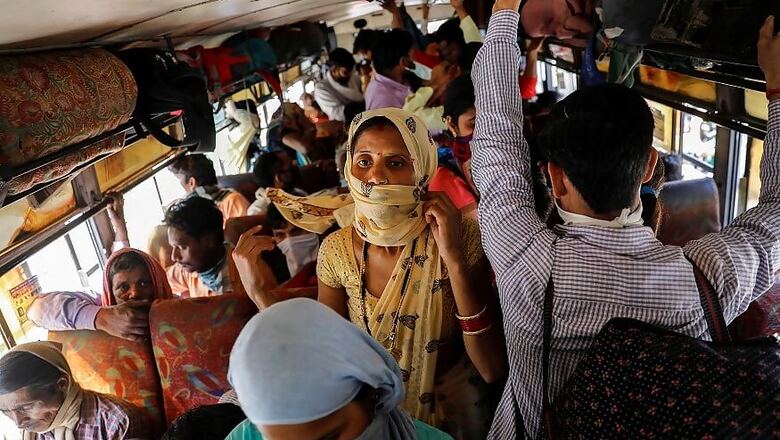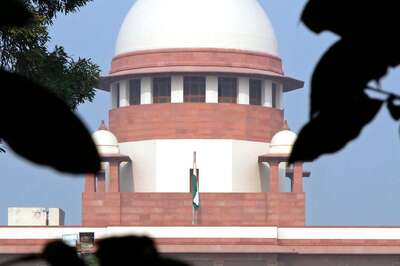
views
As the coronavirus causes turmoil around the world, it is forcing all of us to not only grapple with the present but also to consider how it would impact us in the future.
Predictions are always risky. Edgar R. Fiedler, a noted American economist, warns us, "He who lives by the crystal ball soon learns to eat ground glass." Nevertheless, current trends could define, with some accuracy, the trajectory of future events.
Some facts about the near future are clear. We are going to see a period of economic hardship that will leave no one untouched. Even when the lockdown is lifted, many industries will take time to rebound due to reduced demand and a global recession. The poorest will be the hardest hit as unemployment rises and vulnerabilities increase in the unorganized sector.
Even when the curve is flattened, coronavirus will still be prevalent, and social distancing will remain the norm. Our social interactions with all except our close friends and family will be hesitant and tinged with suspicion.
Work culture could also be impacted, with many opting to work from home. The pace to replace humans with robots in manufacturing and with Artificial Intelligence in the service sector would be speeded up.
It would be logical to expect that the world comes together to fight a common enemy. Unfortunately, the reverse will happen. Some trends of our geopolitical future were already visible – de-globalisation, the rise of nationalism, weakening of international institutions, and rivalry between major powers. The advent of the coronavirus has accelerated these trends.
As developed countries turn insular, the benefits of globalisation accruing to the developing world will diminish, adversely impacting already stressed economies. Migration and foreign remittances will be hit. There will be an escalation of the U.S.-China economic and technology decoupling with supply chain disruptions, although this presents some opportunities for countries like India.
Even as the global situation looks grim, the social and political consequences of the pandemic within countries could be more significant. Nation-wide surveillance of citizens could become the norm. The Chinese have used a combination of facial recognition, location tracking, contact tracing, and a host of apps to monitor the spread of coronavirus.
Other nations are not far behind, with almost all of them tracking millions of citizens through specially developed apps or even directly from cellphone operators. Israel approved its intelligence agency, Shin Beth, to track mobile data of people suspected of having the virus. Pakistan Prime Minister has stated that the Inter-Services Intelligence agency is using its “track and trace” system, meant to be used against terrorism, to fight the coronavirus.
Several countries are now coming to grips with the pandemic, but the virus will be around for a long time until the vaccine is developed. In these circumstances, digital surveillance will continue, and governments will be reluctant to cede control. Countries that have a strong privacy law could see the courts applying some checks on state authority. The Israeli High Court of Justice recently ruled that the Shin Bet security service’s cellphone tracking of confirmed coronavirus carriers cannot continue unless the government anchors the practice in law. However, citizens of countries like India that have no personal data protection law could find little relief.
As countries close their borders, and there is a weakening of international institutions, it is easier than ever to invoke the nationalist sentiment. In times of crisis, people have little option but to depend on their nation-state and have complete faith in the political leadership. It is for this reason that the approval ratings of most world leaders have surged during the coronavirus crisis. This backing of the people could tempt some leaders to centralise greater authority in their hands, as has already happened in countries like Cambodia, Thailand, and Hungary.
It is now apparent that while the virus does not distinguish between the rich and poor, it will, at least in the short term, exacerbate inequality. Even in highly developed economies like the US, the coronavirus has taken a disproportionate toll on the low-income groups and people of colour. In Chicago, African-Americans make up 30 per cent of the population but have accounted for 68 per cent of the city's fatalities.
Our problems with the migrant workers have very starkly exposed the rich-poor divide in India. And now, as we stay locked up in our houses, putting out videos of yoga, dancing, and cooking, hundreds of daily workers are out working the fields in Punjab, delivering our essential supplies, and clearing our garbage. They are continually putting themselves at considerable risk to the coronavirus but have no option. Whether they will be able to afford the cost of the vaccine, when developed, is still uncertain. Social disorder could result if a large section of society remains dissatisfied.
In this somewhat gloomy prediction, is there a long-term silver lining? As Albert Einstein said, “In the midst of every crisis, lies great opportunity”. The good news is that the pandemic has shown us that governance, as usual, will not work, and priorities must change. Human security should take centre stage with a focus on marginal sections of society, healthcare, unemployment, and a social safety net. People across all spectrums will demand a better economic future that shields them from the disruption of the type that we see today.
Social media could slowly lose its coercive influence and go back to its traditional role of social networking. When people are struggling to make ends meet, there would be little appetite for communal or political polarisation. Citizens would demand visible action by the government on the ground rather than tweets on their phone.
If this leads to a political leadership that is more sensitive to the needs of the citizens rather than a mere focus on winning elections, it may be the best thing that comes out of this crisis. However, for any significant change to happen, the four pillars of democracy - the legislature, the executive, the judiciary, and the press - may not be enough. Confidence in these institutions has waned, and peoples’ power will have to be exerted.
Many of those reading this article could say that both the pessimistic and optimistic scenarios are overstated. Perhaps, but if some introspection leads us to even finding a middle path, it would be an improvement.




















Comments
0 comment